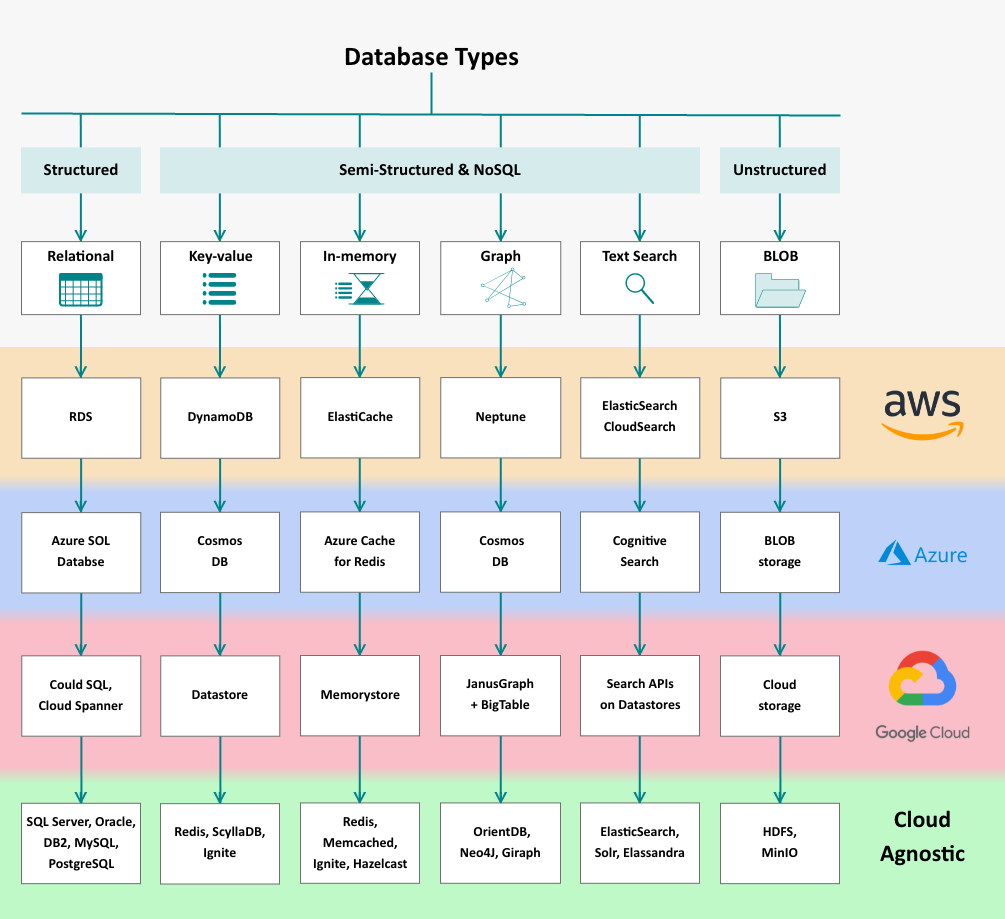
Starting a new project is exciting but challenging. One of the most important decisions you'll make is selecting the right database, which is foundational to your application's scalability, performance, and long-term success. In today’s cloud-centric world, there are numerous database options from cloud providers like AWS, Azure, and Google Cloud, as well as cloud-agnostic options that offer flexibility if you decide to change or combine cloud services in the future.
In this guide, we’ll walk you through various database types and the cloud providers that support them, helping you choose the right one for your full-stack development or enterprise project.
Why Database Selection Matters
The right database choice can streamline your development and ensure scalability, while the wrong choice may lead to costly rework down the road. Let’s look at the types of databases commonly used in modern projects and their respective cloud services.
Types of Databases and Their Cloud Providers
1. Relational Databases
Relational databases organize data into tables with defined relationships between them. They're great for applications that require structured data and strict transactional integrity, such as financial systems.
Top Providers:
- AWS: Relational Database Service (RDS)
- Azure: SQL Database
- Google Cloud: Cloud SQL, Cloud Spanner
- Cloud Agnostic: MySQL, PostgreSQL, Oracle, SQL Server, DB2
2. Key-Value Databases
Key-value databases are NoSQL databases that store data in simple key-value pairs, making them ideal for applications needing quick data retrieval, like caching and session management.
Top Providers:
- AWS: DynamoDB
- Azure: Cosmos DB
- Google Cloud: Datastore
- Cloud Agnostic: Redis, ScyllaDB, Ignite
3. In-Memory Databases
In-memory databases keep data in RAM for ultra-fast access, making them perfect for applications requiring real-time data processing, like online gaming or financial trading platforms.
Top Providers:
- AWS: ElastiCache
- Azure: Cache for Redis
- Google Cloud: Memorystore
- Cloud Agnostic: Redis, Memcached, Ignite, Hazelcast
4. Graph Databases
Graph databases excel at managing complex relationships and connections, such as social networks or recommendation engines.
Top Providers:
- AWS: Neptune
- Azure: Cosmos DB
- Google Cloud: JanusGraph + BigTable
- Cloud Agnostic: Neo4J, OrientDB, Giraph
5. Full-Text Search Databases
Full-text search databases offer fast search capabilities for unstructured and semi-structured data, often used for applications with rich search features, like e-commerce sites or knowledge bases
Top Providers:
- AWS: Elasticsearch, CloudSearch
- Azure: Cognitive Search
- Google Cloud: Search APIs on Datastore
- Cloud Agnostic: Elasticsearch, Solr, Elassandra
6. BLOB (Binary Large Object) Storage Databases
BLOB databases are used for storing large files, such as multimedia content or large documents. They’re cost-effective for applications handling substantial unstructured data.
Top Providers:
- AWS: S3
- Azure: Blob Storage
- Google Cloud: Cloud Storage
- Cloud Agnostic: HDFS, MinIO
How to Choose the Right Database
Selecting the ideal database for your project depends on your data structure, scalability needs, and how you plan to use the data:
- Relational databases work best for applications needing strong data consistency.
- Key-value databases are suited for high-speed caching and real-time data applications.
- In-memory databases support applications with rapid data processing needs.
- Graph databases are optimal for applications where relationships between data points are crucial.
- Full-text search databases are valuable when fast, complex search capabilities are required.
- BLOB storage is ideal for applications handling large media files.
Making Your Project Database-Agnostic
Choosing cloud-agnostic database options can increase flexibility, allowing you to shift between providers or even run an on-premise solution without significant changes. For many businesses, this is an attractive option for long-term scalability and adaptability.
Wrap-Up
Now that you’re familiar with the types of databases and the services that major cloud providers offer, you’re well on your way to making an informed choice for your next project.
At Seaflux, we specialize in helping businesses select the right technologies to fuel their growth. Whether you’re still evaluating options or need a customized database solution, our team is here to assist. Schedule a consultation with us to explore your options and find the perfect fit for your needs.

Jay Mehta
Director of Engineering







